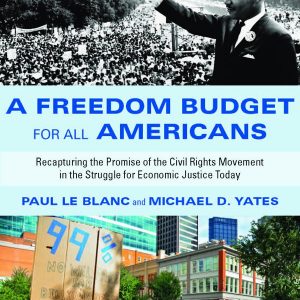BOOK REVIEW
Freedom Now Vision Unfinished
A FREEDOM BUDGET FOR ALL AMERICANS RECAPTURING THE PROMISE OF THE CIVIL RIGHTS MOVEMENT IN THE STRUGGLE FOR ECONOMIC JUSTICE TODAY BY PAUL LEBLANC AND MICHAEL D. YATES NEW YORK: MONTHLY REVIEW PRESS, 2013, 245 PAGES, $16.95 PAPERBACK.
Sunday 19 January 2014, by Malik Miah
This new book, A Freedom Budget for All Americans, by Paul LeBlanc and Michael Yates looks back at a piece of history from the Civil Rights Revolution that gets little if any mention today. It’s a time worth revisiting as the proposals offered in the Freedom Budget remain unfulfilled.
The Freedom Budget for All Americans was issued at a broadly endorsed conference in 1966. It was initiated by civil rights leaders A. Philip Randolph and Bayard Rustin, who co-founded the A. Philip Randolph Institute with funding from the AFL-CIO. The objective was to keep the momentum after the 1964 Civil Rights and 1965 Voting Rights Acts.
The Freedom Budget’s main goal was to end poverty for all American within 10 years, by 1975. Its primary authors were liberal economists and and supporters of the Socialist Party (SP) who were active in the “left wing” of the Democratic Party.
A. Philip Randolph, President of the Brotherhood of Sleeping Car Porters and the only African-American member of the Executive Council of the AFL-CIO, wrote the Introduction. He explained the Budget’s objective:
“The ’Freedom Budget’ spells out a specific and factual course of action, step by step, to start in early 1967 toward the practical liquidation of poverty in the United States by 1975. The programs urged in the ’Freedom Budget’ attack all of the major causes of poverty — unemployment and underemployment; substandard pay; inadequate social insurance and welfare payments to those who cannot or should not be employed; bad housing; deficiencies in health services, education, and training; and fiscal and monetary policies which tend to redistribute income regressively rather than progressively…

Comments are closed.